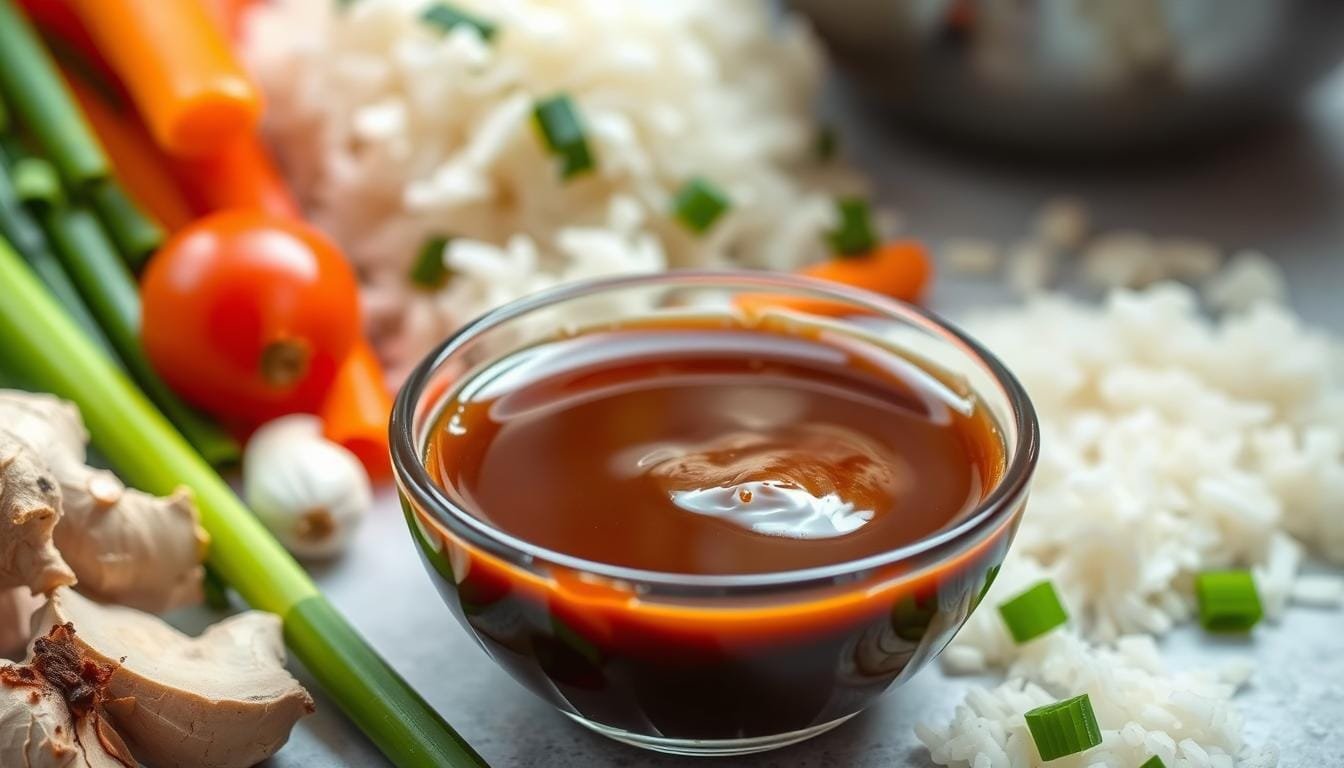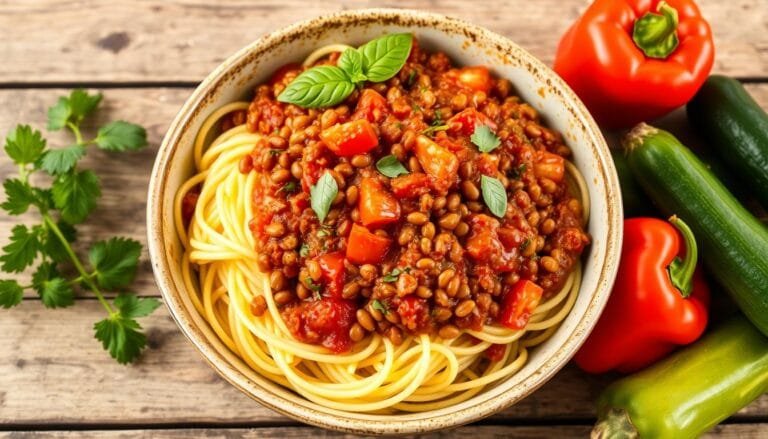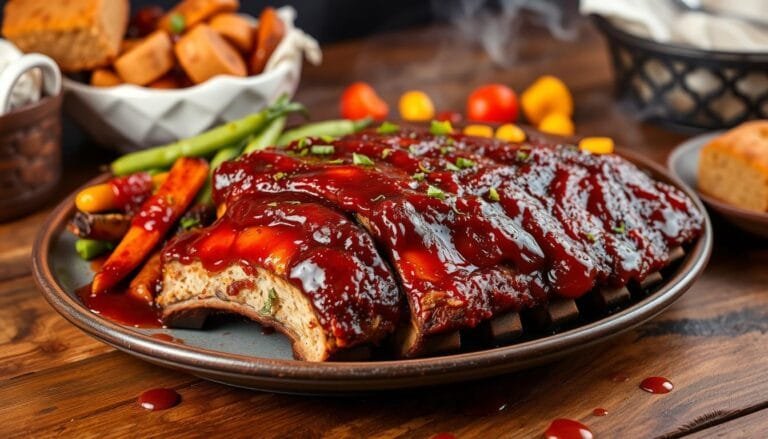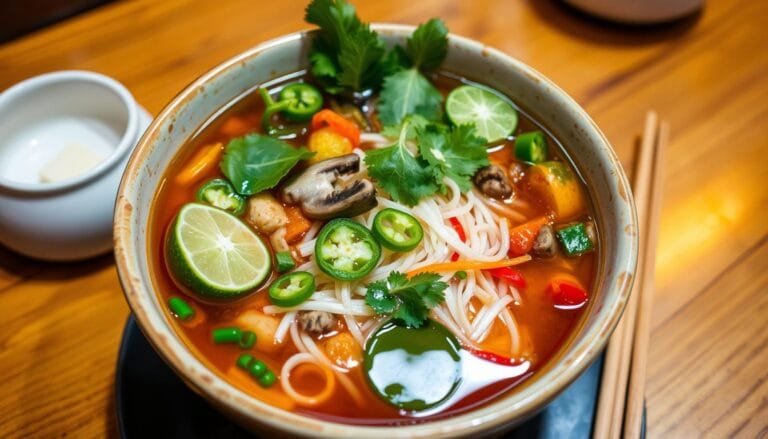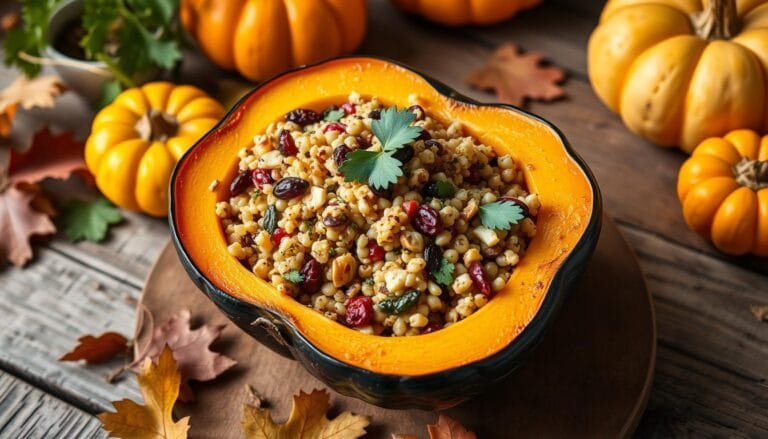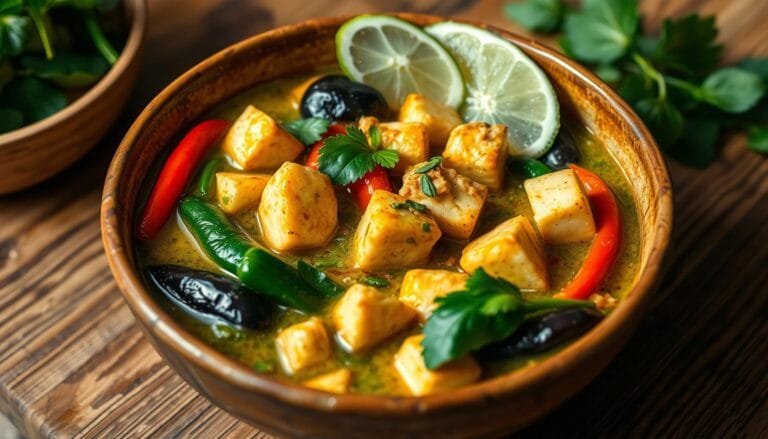I love sauces, and I’m thrilled to share my vegan teriyaki sauce recipe. It’s full of savory, sweet, and spicy flavors. It’s great for stir-fries, tofu, veggies, and more. Plus, it’s ready in just 5 minutes with simple ingredients.
This vegan teriyaki sauce has less sugar than store-bought ones, making it healthier. You can also make it gluten-free if you want. It keeps well in the fridge for up to a week, so you can enjoy it often.
The History and Origins of Teriyaki Sauce
Teriyaki sauce comes from Japan’s rich culinary traditions. Its exact origins are unclear, but it became famous in the 1960s. This was when Japanese food started to become popular in the U.S. The original sauce is a mix of soy sauce, sugar, and mirin, a Japanese rice wine.
But today’s teriyaki sauce is quite different. Japanese immigrants in Hawaii mixed local ingredients with their cooking. They added pineapple juice, brown sugar, and spices, making the sauce sweeter and more complex.
Hawaiian Japanese Influence
The mix of Japanese cooking and Hawaiian ingredients created the teriyaki sauce we know. This fusion became very popular. Soon, many different teriyaki sauces appeared, each with its own twist.
Evolution to Modern Recipe
As teriyaki sauce spread, people started trying new things. They used honey or maple syrup and added spices. This led to many different teriyaki sauces, from traditional Japanese to modern American styles.
Traditional vs Contemporary Versions
Now, you can find both old and new teriyaki sauces. The traditional Japanese sauce is subtle, while the American versions are sweeter. Teriyaki sauce is loved for its versatility and continues to change and delight people.
Essential Ingredients for Vegan Teriyaki Sauce
Making vegan teriyaki sauce at home is easy with a few key ingredients. You’ll need low-sodium tamari or coconut aminos, plant-based sweeteners like maple syrup, and umami-rich ingredients. These elements give the sauce its authentic teriyaki flavor.
To make the perfect vegan teriyaki sauce, you’ll need:
- Low-sodium tamari or coconut aminos for a soy-free option
- Vegetable broth or water
- Maple syrup or coconut sugar as a plant-based sweetener
- Rice vinegar for tanginess
- Garlic powder and fresh ginger for aromatic depth
- Toasted sesame oil for nutty, roasted notes
- Cornstarch as a thickening agent
- Optional red pepper flakes for a spicy kick
This recipe makes a balanced, sticky-sweet teriyaki sauce full of umami. You can adjust the sweeteners and use low-sodium options to make it your own.
| Ingredient | Quantity | Purpose |
|---|---|---|
| Low-sodium tamari or coconut aminos | 1/2 cup | Provides the soy sauce-like base |
| Vegetable broth | 1/4 cup | Adds moisture and dilutes the sauce |
| Maple syrup | 3 tablespoons | Sweetens the sauce |
| Rice vinegar | 2 tablespoons | Balances the sweetness with tanginess |
| Garlic powder | 1 teaspoon | Enhances savory, umami notes |
| Fresh ginger, grated | 1 tablespoon | Provides warm, spicy-sweet aroma |
| Toasted sesame oil | 1 teaspoon | Imparts a nutty, roasted flavor |
| Cornstarch | 1 tablespoon | Thickens the sauce to the desired consistency |
With these ingredients, you’re ready to make a delicious vegan teriyaki sauce. It’s perfect for many plant-based dishes.
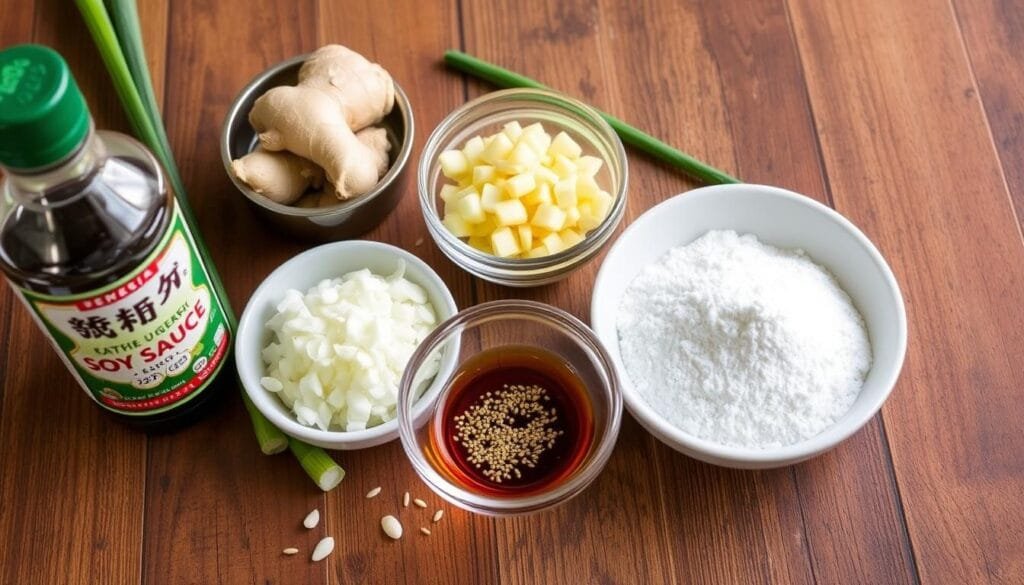
Why Make Homemade Teriyaki Sauce
If you love the taste of teriyaki, making it at home is a great idea. It’s not only cheaper but also healthier. Plus, you can make it just the way you like it.
Health Benefits
One big plus of homemade teriyaki sauce is controlling what goes into it. Store-bought sauces often have too much sugar. But, you can use less sugar and add healthier sweeteners like maple syrup.
Cost Effectiveness
Homemade teriyaki sauce is also a smart choice for your wallet. The ingredients are cheap and easy to find. This way, you can make a lot of sauce without spending a lot.
Customization Options
Another great thing about making your own teriyaki sauce is you can tailor it to your taste. Want it sweeter or spicier? Just adjust the ingredients. It’s a fun way to experiment with flavors.
By making your own teriyaki sauce, you get a healthier, cheaper option. Plus, you can make it your own. So, why not try it and see what you can create?
Step-by-Step Cooking Instructions
Making vegan teriyaki sauce is easy with this recipe. First, mix cornstarch and water in a bowl. This slurry will thicken the sauce later.
Then, in a saucepan, mix coconut aminos, maple syrup, rice vinegar, ginger, and garlic. Heat it over medium, stirring often, until it boils.
- When it simmers, slowly add the cornstarch slurry while whisking. This thickens the sauce perfectly.
- Cook for 5 minutes, whisking often, until it’s thick enough. It will thicken more as it cools, so don’t overdo it.
- If it’s too thin, make more cornstarch slurry and stir it in. But be careful not to make it too thick.
Your vegan teriyaki sauce is now ready. Enjoy its sweet, savory, and umami flavors in your favorite dishes.
| Metric | US Customary |
|---|---|
| 15 minutes | 15 minutes |
| 5 minutes | 5 minutes |
| 10 minutes | 10 minutes |
| 52 kcal | 52 kcal |
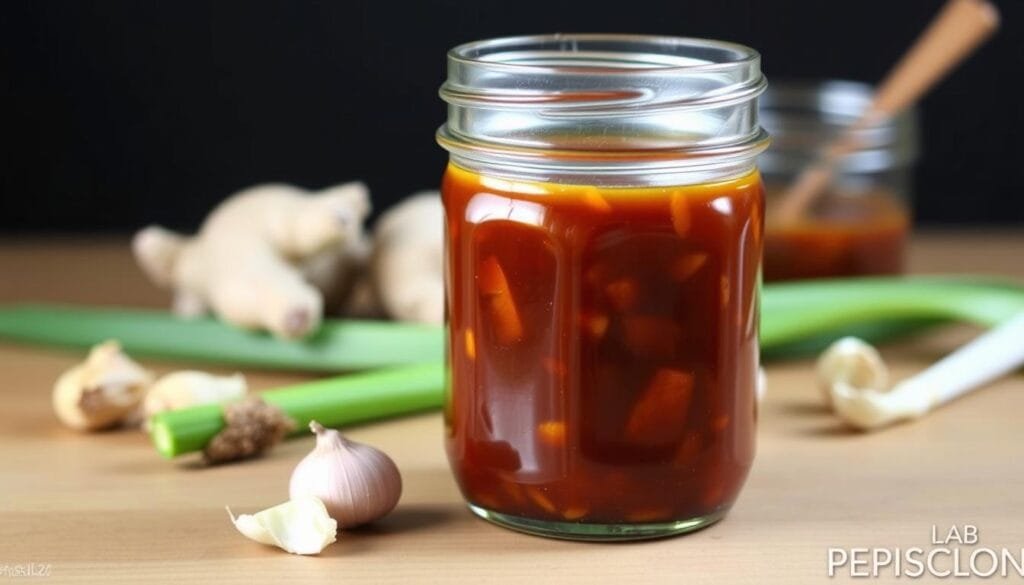
This vegan cooking method lets you enjoy teriyaki sauce without animal products. Coconut aminos, maple syrup, and rice vinegar mix for a sweet, savory, and tangy taste. Try this teriyaki sauce recipe for your next Asian-inspired meal!
Perfect Consistency Tips and Techniques
Getting the right consistency for your vegan teriyaki sauce is key. It should be glossy and cling to your food. Try these tips to get the perfect thickness.
Thickening Methods
- Use cornstarch, arrowroot powder, or tapioca flour to thicken. They make the sauce velvety and luscious.
- Make a slurry by mixing the thickener with cold water. Then add it to the hot sauce. This stops clumps and spreads it evenly.
- Simmer the sauce on low heat for 5-10 minutes after adding the thickener. This lets the starches swell and the sauce thicken perfectly.
Troubleshooting Common Issues
If your sauce is too thin, add more cornstarch or arrowroot slurry slowly while simmering. If it’s too thick, add a bit of water or broth. Remember, it will thicken more as it cools, so aim for a slightly thinner consistency when it’s hot.
Stir the sauce often while it simmers to avoid burning or sticking. Regular stirring helps the thickener work well and keeps the texture smooth.
“Getting the right consistency for your homemade teriyaki sauce is the key to a restaurant-quality finish. With a few simple tricks up your sleeve, you’ll be a master of sauce consistency in no time.”
Flavor Variations and Customizations
Homemade vegan teriyaki sauce lets you tailor the flavor to your liking. You can tweak the sweeteners or try different vinegars. This way, you can make a sauce that tastes just right to you.
For a hint of Hawaiian sweetness, add some pineapple juice. If you like it spicy, mix in chili flakes, Sriracha, or chili garlic sauce. Fresh garlic adds a rich flavor to the sauce.
Toasted sesame seeds give the sauce a nutty taste and a bit of crunch. Or, skip the sesame oil and seeds for a more classic taste. Try using apple cider vinegar to balance the sweetness and tanginess.
| Flavor Variation | Ingredient | Amount |
|---|---|---|
| Hawaiian-Inspired | Pineapple juice | 1-2 tablespoons |
| Spicy | Chili flakes or Sriracha | 1-2 teaspoons |
| Nutty | Toasted sesame seeds | 1-2 tablespoons |
| Traditional | Omit sesame oil and seeds | N/A |
Homemade teriyaki flavor profiles are all about experimenting with sauce variations. You can find the perfect vegan recipe adaptations for your taste. So, get creative and enjoy the process!
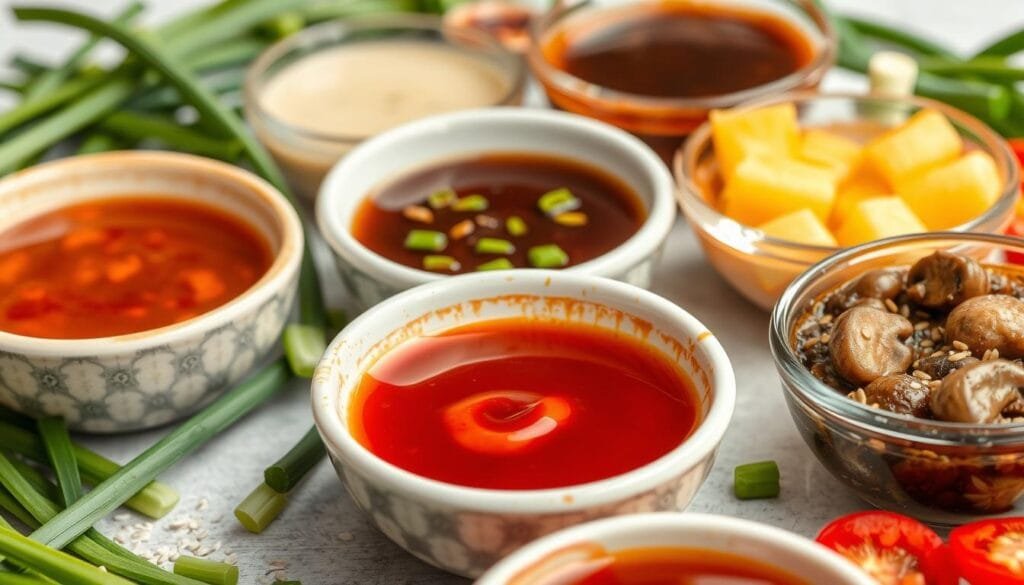
Storage and Shelf Life Guidelines
Keeping your homemade vegan teriyaki sauce fresh is all about proper storage. Cool the sauce down completely before putting it in an airtight glass container. Then, refrigerate it. This way, it will stay good for 7-10 days.
If the sauce gets too thick in the fridge, just add a little water or broth. This will thin it out again.
For longer storage, you can freeze the sauce. Put the cooled sauce in a container safe for the freezer. It can stay frozen for up to 3 months.
To use it again, thaw it in the fridge overnight. Or, gently heat it on the stovetop, stirring often to get the right consistency.
Refrigeration Tips
- Store cooled sauce in an airtight glass container in the refrigerator.
- Refrigerated teriyaki sauce will keep for 7-10 days.
- Sauce will thicken when chilled; thin with water or broth before use.
Freezing Instructions
- Transfer cooled sauce to a freezer-safe container.
- Freeze for up to 3 months.
- Thaw in the refrigerator overnight or reheat gently on the stove, stirring to reconstitute consistency.
By following these simple tips, you can enjoy your homemade vegan teriyaki sauce for longer. Whether you refrigerate or freeze it, the main thing is to keep it sealed. This helps keep it fresh and flavorful.
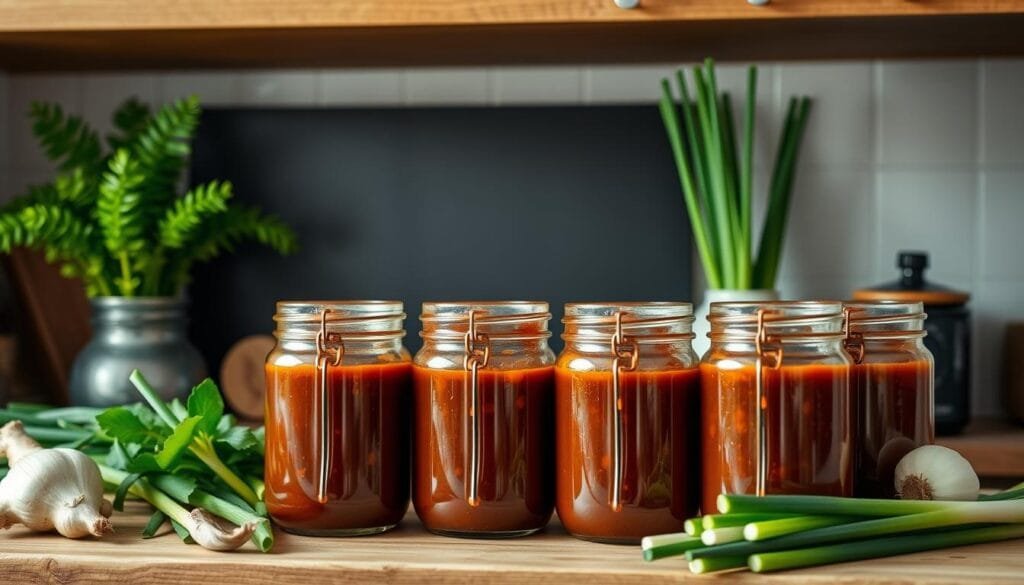
| Storage Method | Shelf Life |
|---|---|
| Refrigerated | 7-10 days |
| Frozen | Up to 3 months |
Best Ways to Use Vegan Teriyaki Sauce
Homemade vegan teriyaki sauce is a versatile condiment. It can elevate many teriyaki recipes, vegan meal ideas, and Asian-inspired dishes. It adds a sweet and savory punch to meals. It’s also a healthier alternative to store-bought options.
One great way to use this sauce is as a marinade. Whisk it together with tofu, tempeh, or other plant-based proteins. Let it soak for 30 minutes to an hour before cooking. This makes the protein tender and flavorful.
Teriyaki sauce is also excellent in stir-fries. Mix it with fresh vegetables and serve over steamed rice or noodles. Add sesame seeds or green onions for extra flavor.
Use the sauce as a glaze for roasted vegetables. It caramelizes beautifully, making a sticky-sweet coating. It’s also great for dipping spring rolls or dumplings.
Get creative with the teriyaki sauce. Try it in teriyaki burgers, noodle bowls, or as a dressing in Asian-inspired salads. The possibilities are endless.
Homemade vegan teriyaki sauce adds sweetness and umami to your dishes. Experiment with different flavors. Enjoy the endless ways to use it in your vegan meal ideas and Asian-inspired dishes.
Nutritional Benefits and Dietary Information
As a vegan, I’m always searching for tasty and healthy recipes. Homemade vegan teriyaki sauce is perfect for me. It’s lower in calories and sugar, which is great for those watching their diet.
This recipe lets me control the sodium. I use low-sodium tamari or coconut aminos instead of regular soy sauce. This helps keep the low-sodium options in check, which is good for those on a low-sodium diet.
Also, this teriyaki sauce is gluten-free when made with tamari or coconut aminos. It’s a great choice for people with dietary restrictions. The flavors are savory, sweet, and umami, without any cholesterol or saturated fats.
